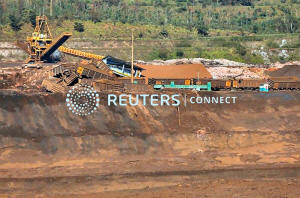|
Five arrested, including three Vale
staff, after Brazil dam disaster
 Send a link to a friend
Send a link to a friend
 [January 29, 2019]
By Gram Slattery and Pedro Fonseca [January 29, 2019]
By Gram Slattery and Pedro Fonseca
BRUMADINHO, Brazil/RIO DE JANEIRO (Reuters)
- Three employees of Brazilian miner Vale SA and two other engineers
working on behalf of the company were arrested on Tuesday, state
prosecutors said, deepening a crisis for the company after another
deadly disaster at one of its mines.
In a statement on Twitter, Vale said it was cooperating with
investigators, who are probing a mining catastrophe that is likely to
leave a death toll of more than 300 people. The tragedy has enraged many
in Brazil, and raised fresh questions about Vale's commitment to safety
after a similar dam collapse at a mine it joint-owned just over three
years ago.
Two of Vale's senior managers at the Corrego do Feijao mine - where a
tailings dam burst last Friday, drowning the nearby town of Brumadinho
in mining waste - were among those arrested, according to the local
judge's decision, seen by Reuters. The job of the third Vale employee
was not immediately clear.

Two other engineers, who worked on behalf of Vale and are accused of
attesting to the safety of the dam, were arrested in Sao Paulo, state
prosecutors there said.
Minas Gerais state investigators issued a total of five arrest warrants
and seven search warrants, on suspicion of murder, falsification of
documents and environmental crimes, the judge's decision showed.
Offers of recompense from Vale SA for one of the deadliest mining
disasters in decades have largely fallen on deaf ears.
Chief Financial Officer Luciano Siani said Vale was doing all it could,
offering money to mourners, extra tax payments to local government, a
special membrane to remove mud from the river and major investments to
make its dams safer.
Yet residents in the devastated town of Brumadinho have been unmoved,
watching in shock and anger as one dead body after another has been
pulled from the mud.
The collapse of the dam in the hilly, pastoral region has caused 65
confirmed deaths so far, according to firefighters' count on Monday
night, with another 279 people lost and likely dead.
Coming on the heels of a deadly 2015 tailings dam collapse just a few
towns over, at a mine half-owned by Vale, the disaster remained
unforgivable in the eyes of many Brazilians.
[to top of second column]
|

A view of a dam owned by Brazilian mining company Vale SA after it
collapsed, in Brumadinho, Brazil January 29, 2019. REUTERS/Adriano
Machado

"Vale is destroying Minas Gerais," said Robinson Passos, 52, who
lost a cousin and friends in Brumadinho.
"There's anger, sadness, everything," he said, holding back tears as
he surveyed the destruction in Corrego do Feijao, a small hamlet
within Brumadinho that gave its name to the mine at the center of
the disaster.
Vale CFO Siani said the company would donate 100,000 reais ($26,600)
to each family that had lost a loved one, adding the company would
continue paying mining royalties to Brumadinho despite a halt in
operations there.
The company was building a membrane to stop the flow of mud now
snaking down the Paraopeba River. A "bold" investment plan would
also speed up the process of making dams more secure, he said.
Prosecutors and politicians have not been impressed.
On Monday, a presidential task force contemplated forcing out Vale's
management. Brazil's top prosecutor said the company should be
criminally prosecuted and executives held personally responsible.
Mines and Energy Minister Bento Albuquerque said the regulatory
model for the mining industry was broken.
In a TV interview on Sunday, Vale CEO Fabio Schvartsman seemed to
agree. "We are 100 percent within all the standards, and that didn't
do it," he said.
(Reporting by Gram Slattery in Brumadinho and Marta Nogueira in Rio
de Janeiro; Editing by Lisa Shumaker, Louise Heavens and Mark
Potter)
[© 2019 Thomson Reuters. All rights
reserved.]
Copyright 2019 Reuters. All rights reserved. This material may not be published,
broadcast, rewritten or redistributed.
Thompson Reuters is solely responsible for this content.

 |